Sylhet could likewise be a city in eastern Bangladesh, on
the Surma River. It's known for its Sufi sanctums, somewhat like the lavish
burial place and mosque of fourteenth-century holy person Hazrat Shah Jalal,
presently a critical journey site close to Dargah Gate. the small Museum of
Rajas contain possessions of the nearby author Hasan Raja. A 3-domed passage
remains at the seventeenth century Shahi Eidgah, a gigantic outside peak mosque
worked by Emperor Aurangzeb.
 |
| Keane Bridge |
What to decide around there:
1. Dargah Mosque: In 1400, a mosque was inbuilt the Dargah
premises of Sultan Abu Muzaffar Yusuf Shah of Bengal. it had been revamped in
1844 during the standard of Bahram Khan Faujdar. at this current, it's one
among the mosques around there.
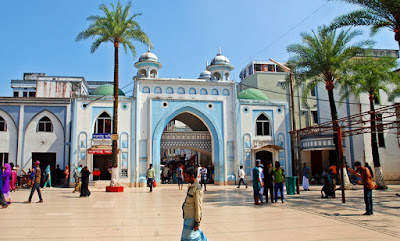 |
| Dargah |
Transportation: the space from Sylhet railroad station or
transport terminal is around 3 km. Rent 150.00-200.00 rupees in an auto-CNG.
2. Shah Paran: Shah Paran was a fourteenth-century Sufi holy person of
the Sylhet area. In 1303, he partook in the last clash of the Conquest of
Sylhet drove by his maternal uncle Shah Jalal.
Shah Paran's original name is obscure however it has been
proposed that his name was Farhan which later got ruined into Poran, signifying
"soul". Poran is utilized as a pet name inside the Bengali language.
Others propose that Shah Paran was a defilement of Shah Piran signifying
"ruler of pirs".
He was brought into the world in Hadramaut, Yemen in the
thirteenth century. His dad's name was Muhammad who passed on when Paran was 11
years of age. Paran concentrated under his granddad Syed Ahmad Kabir Suhrawardi
and later with Amin, a dervish from Neshapur. He chose to go with Shah Jalal,
his maternal uncle, in his undertaking across the Indian subcontinent to
engender the religion of Islam.[3] In 1303, Paran partook in the last clash of
the Conquest of Sylhet under Shah Jalal's authority against Raja Gour Govinda.
 |
| Shah Paran |
At some point after, Paran was said to have devoured one of
the Jalali Kobutor, the pigeons that Jalal got as a blessing from Nizamuddin
Auliya in Delhi. Accordingly, Paran was exiled outside of Sylhet town He set up
a khanqah on top of a slope in current Khadim Nagar, Dakshingarh which came to
be referenced as Shah Paran's slope
3. Keane Bridge: The name Keane's Bridge is enunciated with
staggering pride in light of the fact that the word Sylhet is explained. The
way of Sylhet Keen Bridge of Sylhet. Halting on the Surma River, this framework
teaches the walkers about the splendid history of the ages. subsequent to being
disregarded for a sweeping time, this one among the recorded tourist spots has
been renovated recently, and likewise, Keane Bridge has been planned with more
tones and decorations.
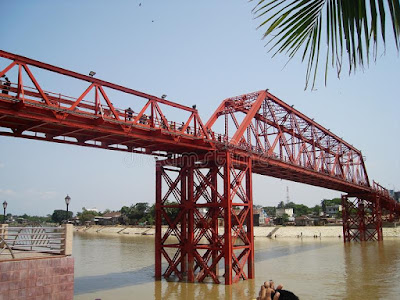 |
| Keane Bridge |
History has shown various things about the framework.
Michael Quinn was the administrative head of Assam inside the 1930s. He by then
visited Sylhet. The expansion was attempted to remain his memory alive. solid
with understudies of history, trains were the techniques for correspondence
with Assam by at that point. there's an essential to making a framework over
the Surma stream for a genuine clarification. In 1933, the Railway Department
got down to business and make a framework over the Surma River. The framework
was officially opened in 1936. The platform is known after Governor Michael
Quinn. Keane Bridge is made of iron. Its shape could likewise be a twisted very
bow. The length of the framework is 1150 feet. Width 18 feet. the occasion of
the augmentation cost around Tk 57 lakh on this manner day.
Transportation: Distance from Sylhet railroad station or
transport terminal is near .650 km. Rent 100.00-120.00 taka in an auto-truck.
4. Syed Ghāzī Burhān: Syed Ghāzī Burhān was a fourteenth-century Sufi Muslim
figure living in Sylhet. he's recognized in tales considering the way that most
of Muslims measure inside the Sylhet territory.
 |
| Syed Ghāzī Burhān |
It is said that there are around 13 Muslim families which
settled inside the mahalla of Tultikar with Burhanuddin being the most
noteworthy of this minority bundle. The antecedents of those thirteen families
entered the subcontinent after Muhammad's repository Qasim's mid-eighth century
win of Sindh and headed twisted Chittagong utilizing the boat. Starting there,
they inside the highest point of the day got Sylhet for dawah and
business-related purposes. The town which the thirteen families got familiar with actually exists today in Tultikar and is seen as Tero Ratan town (thirteen
pearls).
5. Shahi Eidgah: Shahi Eidgah in Sylhet is that the premier
set up Eidgah inside the country. This beguiling Eidgah was worked by Mughal
Faujdar Farhad Khan. Around one and a half lakh devotees can perform Eid Jamaat
here directly. The perspective on Eidgah is amazingly magnificent. Its
territory is inside the Shahi Eidgah space of the town. that is the reasoning
the Eidgah has been so named. Northward of the Eidgah is that the Shahi Eidgah
Mosque, next thereto is that the Forest Officer's Bungalow on a high slant,
southward, is that the Sylhet Center of Bangladesh Television, as an untimely
idea is that the Sylhet Meteorological Office on Capitol Hill near the very
edge of the asylum of Shah Mirarji you might want to trip 22 stages to win
inside the premier where there's Eidgah. By then, there are 15 domed Eidgahs.
There are 10 little and enormous doorways around the cutoff divider. before the
Eidgah may be a colossal lake for purplish-blue.
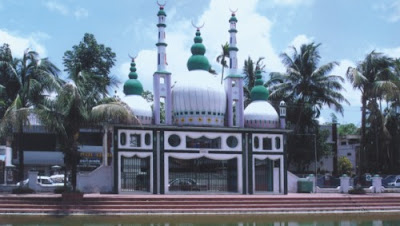 |
| Shahi Eidgah |
Travel distance from Sylhet rail station or transport
terminal is about 3.9 km. Rent 150.00-200.00 taka in an auto-truck.
6..Murari Chand College: Murari Chand College(usually referenced as MC College) was
the essential school inside the Sylhet Division. it had been set up in 1892,
making it the seventh most seasoned school in Bangladesh. From that point
forward it's assumed an urgent part inside the instructive, social, and
political circles of Greater Sylhet.
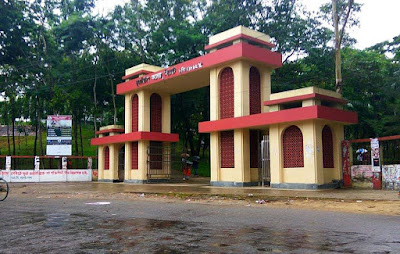 |
| Murari Chand College |
7.Jitu Miah: The Maulvi family, better alluded to as the group of Jitu
Miah was a rich Bengali Muslim jagirdar group of Maulvis situated in Sylhet.
They assumed significant strict and political parts inside the historical
backdrop of Sylhet, Bengal, and subsequently the subcontinent. Jitu Miah, the
last jagirdar of the family, kicked the bucket in 1925 without leaving a
beneficiary. Nonetheless, the family home oversaw by the public authority kept
on being an unmistakable milestone inside the town and a tradition of the
family.
 |
| Jitu Miah |












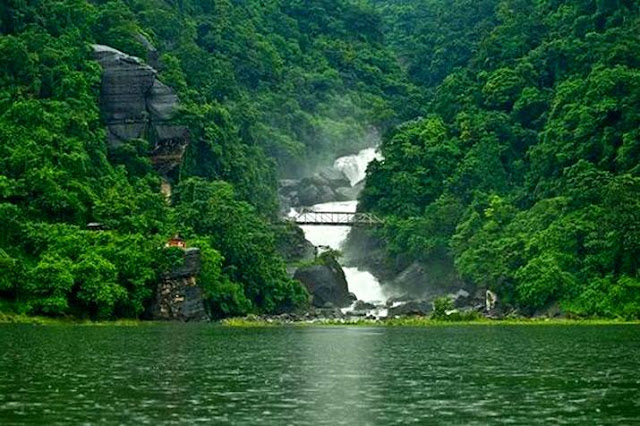



Very informative article.
ReplyDelete